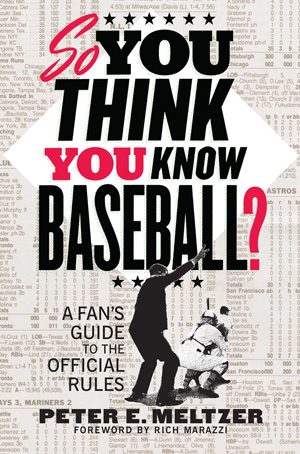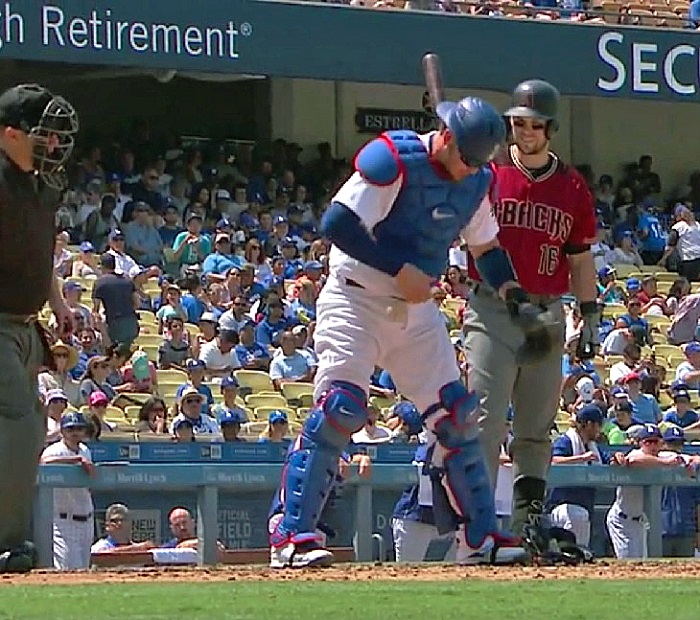A few weeks back I was having a nice chat with Dodgers bench coach Bob Geren in the dugout before a game. While we were talking a fellow writer approached us and said “Hey Bob, I just read a book and you’re in it.” Geren smiled and said “You mean that book about knowing the rules?” The writer said “Yeah, that’s the one. It has your four-out play in it.”
I looked at Geren quizzically and said “A four-out play?” to which he said “Yeah, there actually is such a thing and I was involved in one back in my playing days.”
Knowing that Bob was rather busy at the time, I didn’t want to bother him for the details. Instead, I went online and found the book on eBay for around $8.00 and ordered it. The title of the book is: So You Think You Know Baseball – A Fans Guide to the Official Rules written by Peter E. Meltzer and published in 2013.

(Image courtesy of W.W. Norton and Company)
When the book arrived I jumped right into it and found that I couldn’t put it down. Not only was I amazed at the obscurity of some of MLB’s actual rules, I was even more amazed at how little I knew about some of them. (Did you know that when a fair ball bounces into the stands it’s actually a “book rule double” and not a “ground rule double?” Ground rules are, in fact, ballpark specific – such as the ivy at Wrigley Field – and are clarified before each game at home plate when lineup cards are exchanged).
Sure enough, right there on page 77 was Geren’s four-out play. It occurred on July 1, 1989 when Geren was a member of the New York Yankees. The Yankees were playing the Milwaukee Brewers – then of the American League – and were leading by a score of 4-1.
With one out in the bottom of the eighth inning and with Mike Pagliarulo on third base and Geren on first base, Wayne Tolleson attempted a suicide squeeze bunt that was caught in the air by Brewers pitcher Jay Aldrich. Taking his time, Aldrich calmly threw to first base to double up Geren, who had broken for second on contact. But before Geren was doubled off first base, Pagliarulo had crossed home plate. He immediately ran to the dugout to retrieve his glove believing – like everyone else – that the inning was over and that his run had not counted. Because it was a suicide squeeze and like Geren, Pagliarulo had taken off on contact and never tagged up after Aldrich caught the ball, nor did he ever attempt to return to third base to do so.
Lo and behold Pagliarulo’s run did count. How so, you ask? Because the Brewers never appealed that Pagliarulo had left third base early without tagging up, as per MLB’s appeal rule 7.10(a).
“It’s a ‘fourth-out’ situation,” umpire Larry Barnett later explained. “Milwaukee had to throw the ball to third base for what would be the fourth out. Then they can choose to make that one the final out and prevent the run from scoring. But Milwaukee didn’t do that.”
And with that, (now) Dodgers bench coach Bob Geren notched his place into baseball history – albeit a small notch.
On Sunday afternoon an equally bizarre play occurred during the Dodgers eventual 14-3 rout of the Arizona Diamondbacks at Dodger Stadium. With two outs and Dbacks third baseman Jake Lamb on third base and right fielder David Peralta on first base, Dodgers right-hander Ross Stripling threw a curveball in the dirt that bounced up and hit Dodgers catcher Yasmani Grandal under the mask knocking it off. The ball then went behind Grandal’s chest protector where it became lodged. The confused Dodgers catcher then touched the outside of his chest protector and realized that the ball was still in there. He then pulled the bottom of the protector away from his body and the ball fell harmlessly to the ground – or so he thought.
As it turns out there is, in fact, a rule that covers this exact situation – and I mean exact. Per MLB Rule 5.09(g), when a pitched ball lodges in the umpire’s or catcher’s mask or paraphernalia, and remains out of play, the ball becomes dead and runners advance one base. As such, Stripling was charged with a wild pitch and home plate umpire Todd Tichenor awarded Lamb home and Peralta second base.

Once the trapped ball fell out from behind Grandal’s chest protector, there were a lot of confused looks on a lot of faces. Home plate umpire Todd Tichenor was not among them.
(Video capture courtesy of SportsNet LA)
Yes, it’s in the book – page 33 to be exact. It’s in there because a near identical incident occurred which, ironically, also involved a one time Dodger.
On August 9, 2005, the Cleveland Indians were playing the Kansas City Royals at Kauffman Stadium in KC. With two outs (check) in the bottom of the third inning and Royals shortstop (and former Dodger) Angel Berroa on third base (check) and second baseman Donnie Murphy at the plate, Indians left-hander Cliff Lee threw a pitch that got stuck in catcher Victor Martinez‘s chest protector (check). Lee was charged with a wild pitch (check) and home plate umpire Dale Scott correctly awarded Berroa home (check).
Although Sunday’s incident took a minute or two to sort out and some explaining to Dodgers manager Dave Roberts, Tichenor had made the right call.
…and thanks to Dodgers bench coach Bob Geren – I knew that.




 August 1st, 2016 at 6:00 am
August 1st, 2016 at 6:00 am  by Ron Cervenka
by Ron Cervenka  Posted in
Posted in 

That 4th out ruling is also mentioned in one of Ron Luciano’s books. I’ve used it many times over the years in baseball trivia discussions. Nobody’s got it yet (I guess I won’t be trying it on this site now). Most common answer I get is a dropped 3rd strike. Of course, a strike out of itself doesn’t record an out. The catcher does when he catches the ball, tags the batter, or throws him out at 1b.
I don’t understand either one of these rules, especially the 4th out ruling, to be honest. The third out was a force out thereby ending the inning and according to me, the run doesn’t count.
A runner thrown out trying to tag up after a fly ball is not classified as a force out. I know, it sure looks like a force out to be too. That’s just how the rulebook defines things.
I’m talking about the out recorded at first base, the third out, was a force out.
I suggest reading MLB Rules, rule 5.09 (b), Retiring a Runner. The word “force” is only used in regard to advancing, never retreating.
You may also want to read rule 5.10 (c), Appeal Plays, which states in the notes under 5.10 (c)(4) “Appeal plays may require an umpire to recognize an apparent
‘fourth out.'”
I learned about this from a book written by Ron Luciano, a retired AL umpire.
Thanks for the info, I wasn’t aware of this. Although it’s still confusing.